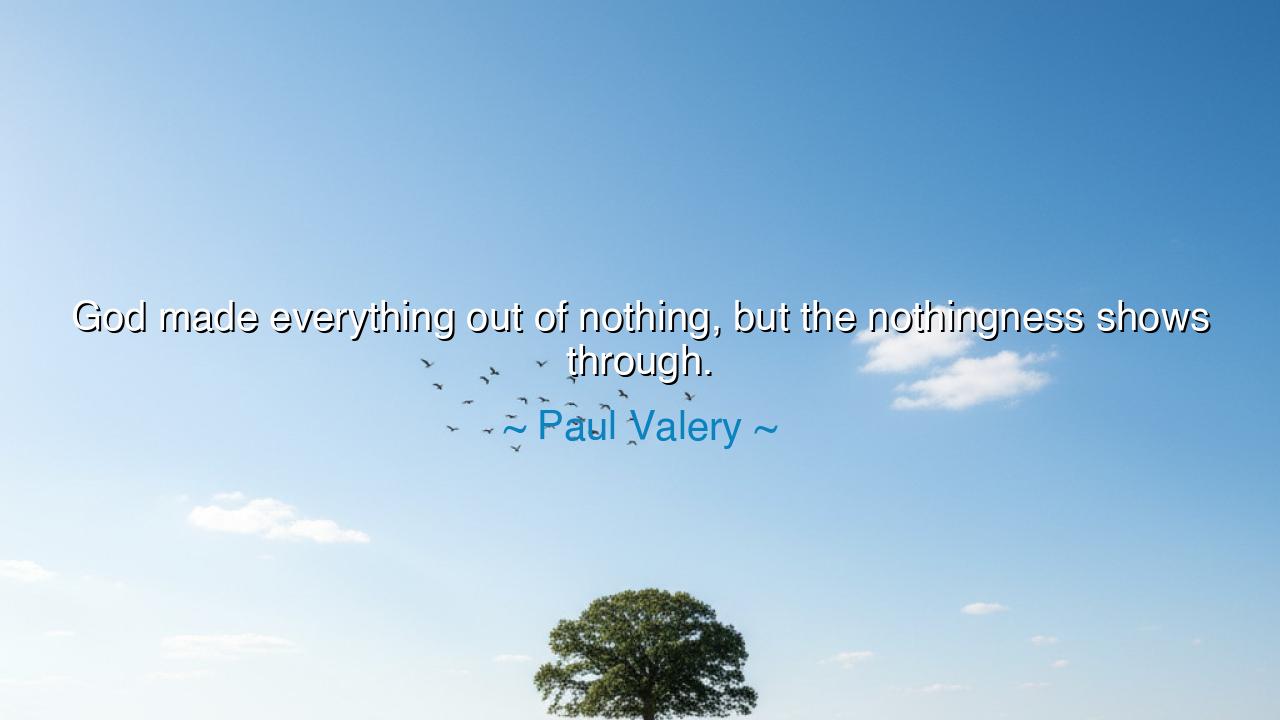
God made everything out of nothing, but the nothingness shows






“God made everything out of nothing, but the nothingness shows through.” Thus wrote Paul Valéry, the philosopher-poet of France, whose mind moved between light and shadow, between reason and mystery. In these few words, he captured one of the deepest paradoxes of existence—the tension between creation and emptiness, between the fullness of being and the void that forever lingers beneath it. To read this line is to hear a whisper from the abyss: that even in the beauty and complexity of the world, traces of nothingness—fragility, impermanence, and loss—are woven into the fabric of all things.
When Valéry says that God made everything out of nothing, he echoes the ancient truth of creation ex nihilo—that from the void, the Divine spoke and the cosmos came into being. But where most saw only the triumph of being over nothingness, Valéry saw something subtler, more haunting. He saw that the void is never fully gone; it still breathes through creation like an echo through a hollow cave. In the light of the sun, he sensed shadow; in the brilliance of human thought, he discerned the limits of understanding; in the triumphs of civilization, he saw the quiet decay beneath the marble. The nothingness shows through, not to mock creation, but to remind man of his smallness, his dependence, his mortality.
Yet this insight is not despair—it is clarity. For in recognizing the presence of nothingness, one comes closer to wisdom. Valéry teaches that life’s beauty is not in its perfection, but in its precariousness. Like a flower that blooms for a day, or a thought that fades upon waking, existence is sacred precisely because it is fleeting. To deny the void is to live in illusion; to see it and still choose to create, to love, to hope—that is the courage of the awakened soul. The poet, the artist, the thinker—all are engaged in this sacred act: to bring light into a world that bears the marks of darkness.
Consider the story of Vincent van Gogh, the painter of blazing suns and trembling stars. His art, vibrant with color and life, was born from a heart haunted by emptiness. He saw the world not as stable, but as trembling with both glory and despair. In every brushstroke he sought to make the nothingness show through—the anguish behind the beauty, the longing within the light. His “Starry Night” is not merely a landscape; it is a vision of creation struggling against the void, of the human soul crying out against silence. Though he lived and died in torment, van Gogh’s art endures as a testament to the truth Valéry expressed: that the divine and the void coexist, and that the power of creation lies in acknowledging both.
The origin of Valéry’s thought arises from his life at the crossroads of science and spirit. He lived in the modern age, when faith and reason wrestled for dominion over the mind of man. As Europe marched toward progress, Valéry saw also its decay—wars born of pride, societies hollowed by materialism, souls starved of meaning. Out of this tension came his insight: that no matter how man builds, the foundation of his world remains fragile. Beneath the cathedrals of art and knowledge lies the eternal nothingness—the reminder that all human achievement is but a temporary defiance of the void.
Yet, in this acknowledgment, there is not hopelessness, but humility and wonder. The wise man does not curse the nothingness—he honors it. For it is the silent space that allows meaning to exist, the darkness against which light is known. Without the void, there would be no creation; without death, no appreciation of life; without silence, no music. The nothingness that “shows through” is not the enemy of existence—it is its shadow and its complement. To see it, and still give thanks, is the beginning of enlightenment.
The lesson for us, then, is to live with both awareness and gratitude. Do not turn away from the fragility of things. Do not fear the emptiness that sometimes presses upon your soul. Instead, let it teach you to cherish what is fleeting. Build, create, love, knowing that all things pass—but that the act of creation itself defies the void. The poet writes, the mother nurtures, the craftsman builds—all knowing their work is temporary, yet doing it with reverence. That is the divine impulse in man: to make something where once there was nothing, even knowing the nothingness will show through again.
So, my child of light and dust, remember this: the cracks in the world are not flaws—they are the fingerprints of eternity. Through them, the infinite breathes. When you feel the weight of emptiness, do not despair; know that it is the same void from which God once drew creation. It is the silence that waits for your song, the darkness that longs for your flame. For though nothingness shows through, it is the sign that you live in a world still unfinished—and that every moment of love, beauty, and creation is your part in the eternal act of bringing light out of nothing.






AAdministratorAdministrator
Welcome, honored guests. Please leave a comment, we will respond soon